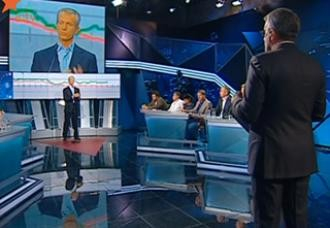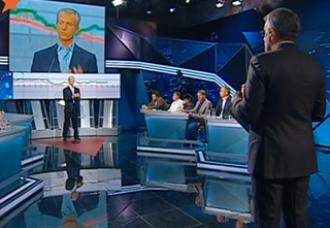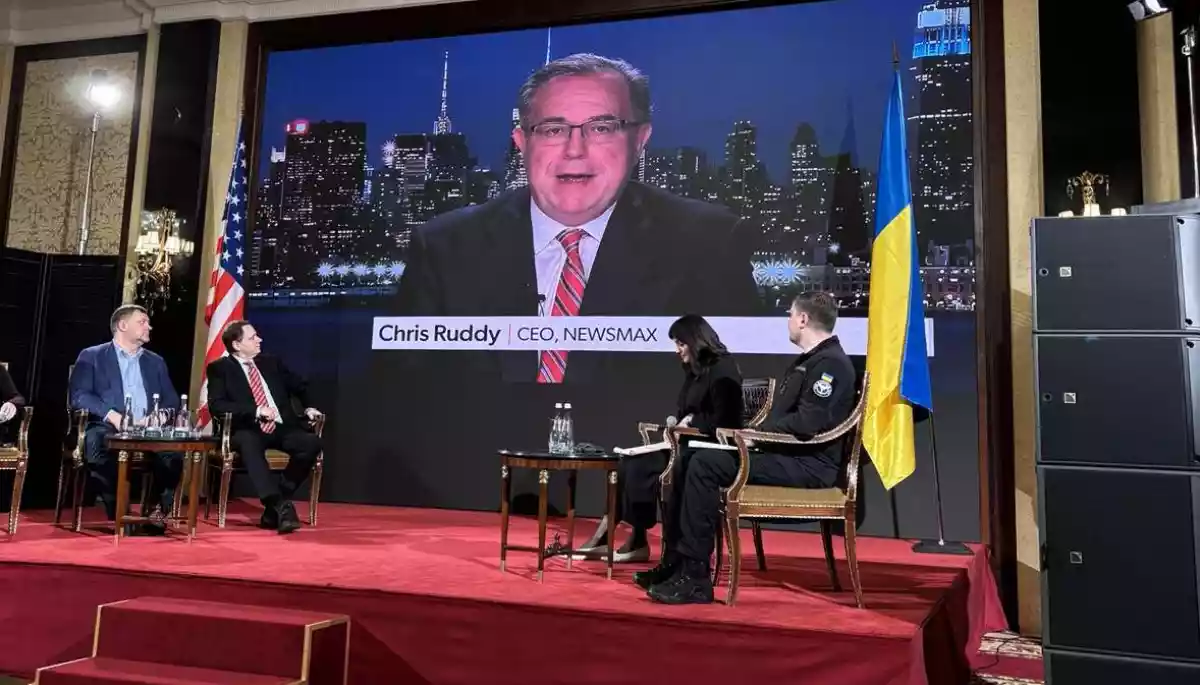
Secrets of political corruption: accusations unanswered


Shuster-Live, First National, 17.10.2014
The list of participants
Specialists who produce television series know that the vast majority of their audience may substantially overlap with an audience of political talk shows and does not like excessive number of characters since the audience of series is not likely to make an extra effort to understand the complex multifigured plots. This, by the way, is one reason that explains the chronic failures quality American TV series experience on our channels.
Of course, we do not know the principle used to select the participants for "Shuster-Live», although it would not be bad if the program's authors openly declared this principle. As we mentioned earlier, virtually unlimited timing creates favorable conditions to represent all variety of opinions. On the other hand, with the huge list of guests the program has, we immediately get a feeling that the alleged topic has no chance for adequate disclosure.
The desire of political forces to use the popular program a week before the elections for propaganda instead of serious discussion was obvious and predictable; and excessive number of guests guaranteed semantic confusion and difficulty with rational perception.
We have another important comment on the selection of participants. Given that the main theme of the program was actually the so-called electoral corruption (especially various forms of vote-buying and other illegitimate means of getting electoral advantage), it was obvious that the program needed some representatives of law enforcement. The message - on behalf of the Interior Ministry – about the seemingly hundreds of offenses connected with the bribery of voters would give viewers the official point of view and the real picture of the criminal proceedings in this area. Moreover, such information could make a strong impression on the viewers, or, at least, on that portion of the citizens who decided to "sell" their votes. This, unfortunately, was not done.
General remarks
Since the first part of the program dealt with the first results of the President’s visit to Milan and appeared as ritual information because it contained an official statement and quite moderate comments of representatives of the main political forces, we will focus on reviewing the second part that was centered on electoral corruption.
While compiling the content of the candidates’ speeches, we can draw the following conclusions:
- The practice of bribing voters is extremely widespread and is usually carried out with single-member districts. The main initiators of illegal actions are either the candidates who have been involved in previous political regime and given the current public mood and open fair competition, have no chance of winning, or “newcomers” who lack social and political backgrounds and try to increase their popularity in short periods of time through bribery since they have great financial capacities;
- Despite the improvements in the public consciousness that occurred as a result of the events at Maidan and war, the practice of bribing voters still remains an effective corruption tool for two main reasons. The first reason is a difficult financial situation of Ukrainian citizens, complicated by the economic crisis that pushes some people to take the material and financial "gifts" from the candidates. The second, and perhaps, more important reason is the effect of frustration over lack of fast and radical changes in line with "Maidan’s ideas." It is not even the expectation of a "better life" in the sense of domestic well-being, but the frustration caused by lack of justice. The lack of punishment for notorious politicians and the appearance of hated politicians in the lists of political parties that supported Maidan alongside the general exhaustion based on the socio-economic turmoil lead to political apathy and tolerance of corruption practices:
- In addition to an open or concealed vote-buying, the candidates started using other dirty elections’ techniques such as dissemination of false defamatory statements about competitors, paid news, pressure on the competitors’ agitators, and attempts to corrupt the members of election committees.
Although a lot of speeches were typical for political promotion which can be seen with the speeches of Oleh Lyashko, many politicians still showed some examples of electoral corruption. Here are a few fragments from the speeches of the participants of the program:
Mykola Katerynchuk: We tried to figure out why people were selling their votes. Well, first, it is because people are poor. 200 hryvnia now is a quarter of the minimum pension. And second of all, a lot of people lost faith that elections could change anything.
Viktoriya Syumar: It would seem that after Maidan everything had to change. I spoke today with Arsen Avakov, the Minister of Interior. He told me that there were more than 20 cases for bribing voters. One of the examples is Euhene Bakulin, a former head of "Naftohaz". This is a person against whom a criminal proceeding is opened, and who is now hiding somewhere abroad. His actions robbed Ukraine by 4 billion US dollars. Today, this man is forming another web on 106th district. He says: I do not buy voters. I buy my agitators. I give them money. You come with your passport, leave your passport number, and you get 200 hryvnia. And the question is: why does he do it this way? I found it to be a very strange thing. It will cost him much cheaper to buy votes this way when he pays even 400 hryvnia than organize an election campaign.
In general, despite citing examples of electoral fraud, the participants delicately omitted specific names of the perpetrators. With the exception of the aforementioned former head of "Naftohaz" participating in elections remotely and being wanted, only Oleh Lyashko mentioned several candidates (such as V. Otroshenko and D. Zhvaniya) as examples of political mimicry. Other speakers somehow shyly avoided names, although the lawyer in the studio urged them to do so. And, the discussion of such acute problems without personification is clearly artificial.
No need to be an expert to ask the logical question: why don’t politicians use the chance to discredit their political opponents who resort to illegal methods when they can do it on TV?
In this case, we are rather talking about the difficulty of gathering evidence in such cases because the bribery is usually conducted through nominees, foundations, pads, and more. This is another good reason that explains impunity of corrupt politicians.
In this situation, it would be good for the program to have a representative of the Ministry of Interior with examples of specific criminal cases that were mentioned by Avakov although the general public was not informed about any high-profile cases of this kind.
The concept of political corruption is much broader than the elementary bribery of voters. This is only the visible "part of the iceberg." But there are also paid news in the media, the financial support of "close" members of election committees, and finally, various forms of the notorious "administrative resource" such as power, regulatory, institutional, informational, and others methods. All of these points would not be too difficult to explain to the audience if the host set such tasks for himself.
The problem is that the most politicians and parties use these methods in different ways and at different scales. Talking about small bribery is the easiest way not to solve the problem, but simply avoid awkward questions for the participants.
When it comes to the methods of battling corruption during elections, they have traditionally ranged between calls to increase candidates’ political responsibility to the methods of guerrilla warfare when some candidates used “special units among supporters" (like what D.Hordon and V.Konstantynovskyi did).
Dmytro Hordon, journalist and broadcaster, the candidate in 220 district (Kyiv): "That is Didovets. I want to appeal to everyone... Slava, now, wait a minute. Afghans came to me alongside the guys who fought in the ATO and residents of Podil who support me and do not believe. From tomorrow, they patrol the streets of Podil. They will catch everyone who will be releasing this stuff against me, against you, against anyone. Dumpsters are ready, and video operators are ready, too. We will push them into trash, and we will show their names, last names, and addresses ".
The temptation of power support of the "good" candidates is also a myth that can lead to the point of absurdity. And we never know the capacities of the "wrong" candidates’ power resource.
Traditional calls for political accountability and oaths not to bribe made by some of the participants on the talk show did not look too convincing and gave the moderator many opportunities to encourage meaningful discussion or show the viewers the helplessness and hypocrisy of potential deputies.
Despite the multidimensionality, the problem of corruption, including electoral, has institutional formula solution. Corruption is minimized when it costs too much comparing to the benefits it may bring.
On practice, it could look this way: 400 hryvnia a voter got as bribery were not worth getting into jail for three years. Parliamentary mandate was not worth, say, 10 years of prison, confiscation of property, and lifelong deprivation from active suffrage (such as the ability to be elected).
Why don’t we have such laws, and why don’t the existing laws work?
Who among parties and politicians demanded to increase the responsibility for the political corruption and proposed specific laws on this subject?
Were there any cases when the party itself got rid of the corrupt candidates who used illegal methods?
How many corrupt candidates in 2004 received punishments for their actions?
What political forces fought for the punishment or, at least, public disapproval of corrupt politicians after 2010 and 2012 elections and did not forget about this matter the day after the vote?
This is only a suggested list of questions that could be asked during the program.
But they were not.
Perhaps, Savik Schuster is satisfied with his supervising role over PR-platform that does not prevent the guests from expressing themselves the way they want; but the candidates should use political advertisement for these expressions.
“Svoboda slova” with Andriy Kulykov, ICTV, 13.10.2014
The only remarkable thing about this issue of “Svoboda slova” was the appearance of two politicians from the old regime who, alongside Tihipko and Boyko, show up on some channels from time to time.
Unlike the vast majority of other former associates who run for the parliament in one-member districts, these two represented their parties. Although they did not put their hopes high on the shows, it would still be strange if the two opposition blocs ignored political shows entirely.
That explains the content, or rather, the lack of it in their speeches. Pathetic attempts of the former head of the Security Service and the Deputy Prime Minister in Azarov’s government to make oneself look like a reformer was not the idea that could gain more support for “Sylna Ukrayina”. The same applies to the chaotic attempts of Nestor Shufrych to appear as a peacemaker.
Similarly to the party’s leader Serhiy Tihipko, Valeriy Khoroshkovskyi used the advice of his political technologists and learned how to avoid unpleasant questions. All of his rhetorical speculations regarding reforms or some sort of special merits for fighting corruption do not mean a thing and lack reasoning and concrete examples. They are being used simply to justify the guest’s presence in the program.
Valeriy Khoroshkovskyi, the candidate from “Sylna Ukrayina”: "If we cling to the history, then we have to look at the steps that have been made. Take, for instance, the period from 2010 to 2012 and see what Security Service has done. And you look at the amount of politicians being imprisoned for the corruption during that time. I am not talking about our political opponents, but those directly connected to the previous government. We had many big imprisonments, gathered a lot of evidence, and this is the story that we can show and say that we fulfilled our promises. ".
Andriy Kulykov, the host: Taras Chornovil.
Taras Chornovil, political expert, "Mr. Valeriy, this is what we have. More recently, I was in power, I was a deputy. But it turned out that the political party to which I belonged promised a lot to do, but did the opposite. It turns out that you were in power during Yushchenko, during Kuchma, and then, you were in power during Yanukovych. I do not mean you personally, but your political party and the leader of your political party. So I imagined myself in that situation. So I would now run for the elections, I would form the party out of former deputies, and I would come to this microphone and say: we are the ones who will do. But I have a question: why didn’t you do anything then, when you were in power? Why did you do the opposite? Why Deputy Prime Minister Tihipko implemented the pension reform you promise to cancel now? Then, why did you do it? I made a decision for myself that I better lustrate myself and not run for the parliament for 5 more years. Perhaps, many people on your list should also lustrate themselves".
Andriy Kulykov, the host: Maybe, you also want to make your own pension reform?
Valeriy Khoroshkovskyi, the candidate from “Sylna Ukrayina”: "Mr. Taras, I applaud your decision for self-lustration. I think it's the right thing to do. Now, I will respond to the second question about our political party making or not making some promises. You know that “Sylna Ukrayina” was disbanded for a certain period of time. Now it has renewed its existence and runs for the parliament. As for the pension reform, I would like to explain this issue a little bit. The pension reform was not implemented by “Sylna Ukrayina” or Tihipko. It was implemented by the government, and parliament voted for it. But the problem of the pension reform is not about its implementation. The problem is exactly that it was not implemented. The government made only the first step, and now, there is a lot of criticism about it. First of all, I believe that the first step was rather unjust toward women because it increased an already high retirement age. But the other steps were not made. For instance, the Pension Fund was not filled, and we still do not have two-level funding system. These things were not accomplished, and it is something that nobody talks about now since everybody criticizes innovations that truly did not bring any benefits. So, my position is to finish the pension reform so people can finally feel that they have more money in their pockets. I believe that Ukraine has never encountered such a problem or the choice we have now. I think that today, uniting the country is the only reason for the new government to exist. It should decrease the pressure that we have now in society and try to equalize different perspectives. “Sylna Ukrayina” runs for the parliament as a national party, but now, we see the voices of the East and South that have to be heard in parliament as well. It will happen if our voters choose and vote for us, and that is why we really ask our voters to come and vote on October 26; we are ready to work for 5 years to make people on the East and the South satisfied with their choice”.
Overall, in terms of credibility, Khoroshkovskyi appeared very vulnerable toward criticism. It was very strange that his political opponents, especially the acting Minister of Justice Pavlo Petrenko, did not use this opportunity to “push” not only him, but the entire party that is predicted high rates by some sociologists. However, Petrenko was satisfied with Khoroshkovskyi’s formal answer regarding his financial situation. It is hard to believe that the Minister of Justice could not prepare and use more convincing facts and even numbers.
In the conclusion, we want to note that recently, and not only on these talk-shows, we noticed some kind of "conciliatory" tendency in the public dialogue between political opponents, and between journalists and politicians. It appears as if the journalists who investigated violations of “former” politicians, lost their enthusiasm after becoming politicians themselves.
At the present moment, we believe that the current situation within and outside our country requires special integrity from the politicians, the journalists, and the public. We are not talking about revenge on political opponents, but about the fact that it is unacceptable to waste the potential of social innovation on small political compromises and backroom agreements.
Monitoring of compliance with professional standards of Ukrainian TV channels during 2014 parliamentary elections was carried by NGO "Telekritika" as a part of the project “Media and elections” with financial support from USAID, provided through the "Internews Network".












